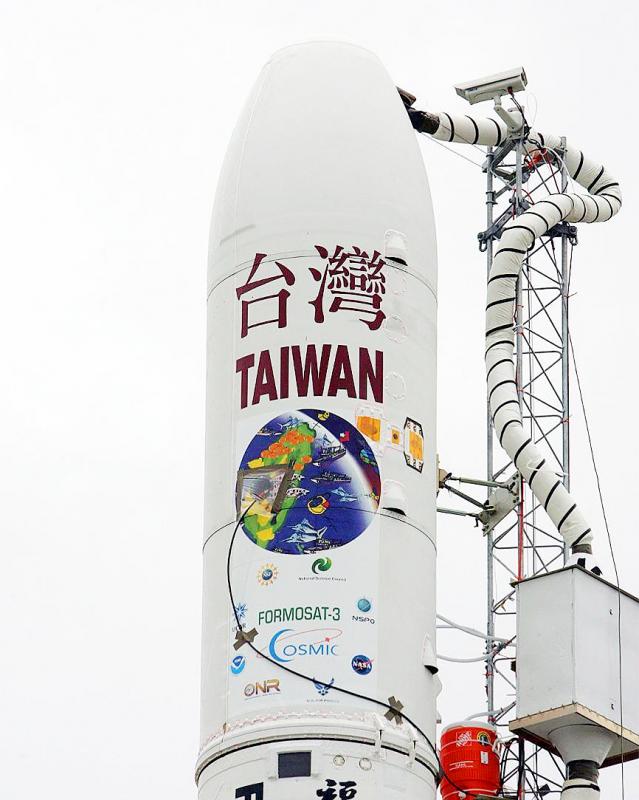All satellites launched by Taiwan are registered at the UN as owned by “Taiwan, Province of China,” while the government said it has requested this be changed.
The UN Office for Outer Space Affairs (UNOOSA) lists satellies launched by Taiwan from 1999 to 2019 as owned by China.
The Web site included entries on Formosat-1 and Formosat-2, which are listed as “ROCSAT 1” and “ROCSAT 2” respectively, Formosat-5, as well as the Formosat-3/COSMIC and Formosat-7/COSMIC-2 constellations.

Photo provided by the National Applied Research Laboratories
The satellites were launched in the US, either from Cape Canaveral in Florida or the Vandenberg Air Force Base in California.
National Space Organization (NSPO) Acting Director-General Yu Shiann-jeng (余憲政) said that Taiwan is not a UN member state and has never filed an application for satellite registration with the UNOOSA.
The office might have its own agenda for collecting the information, but Taiwan was never informed, he said, adding that a registration with other agencies is also not compulsory.
More important than satellite listings with the UN would be Taiwan’s inclusion in international frequency use negotiation, Yu said.
Taiwan negotiates frequencies for satellite communication through the Space Frequency Coordination Group (SFCG), an informal forum, he said.
Asked if China might be trying to interfere with Taiwan’s satellite development through the UN, the Ministry of Science and Technology said that the UN office just compiles data and exerts no substantial influence over the satellites.
“All of the nation’s Formosat satellites are operated by the NSPO, and no other countries can meddle with that,” the ministry said in a statement. “The government will ensure that its satellite control is safe from technical interference.”
Meanwhile, the Ministry of Foreign Affairs expressed its dissatisfaction and protest over the UN’s “inappropriate and false reference” of Taiwan as part of China.
The foreign ministry has instructed its overseas offices to clarify the nation’s stance to the UN office, and make clear that Taiwan and China are not subordinate to each other, foreign ministry spokeswoman Joanne Ou (歐江安) said in a statement on Wednesday.
Ou did not specify which overseas offices have lodged a protest.
Only when the UN office maintains its neutrality can it help countries worldwide to sustainably develop space exploration and to peacefully use orbital resources, she said.
The science ministry previously said that it budgeted NT$4 billion (US$140.53 million) for the development of a low-orbit communications satellite named Beyond 5G, which would be launched in about 2025.
However, the frequencies used by this satellite might not be available through the SFCG, Yu said.
Therefore the government would commission foreign consultancies to negotiate frequency use through the International Telecommunication Union, a UN agency, Yu said.
The government has also commissioned consultancies to obtain frequencies for Formosat-2, which was initially planned as a communications satellite, but later repurposed for remote sensing, Yu said.
Former NSPO director-general Chang Guey-Shin (張桂祥) in 2011 received a delegation including UNOOSA officials, but the meeting was about disaster management, not satellite registration, Chang said.

CHAOS: Iranians took to the streets playing celebratory music after reports of Khamenei’s death on Saturday, while mourners also gathered in Tehran yesterday Iranian Supreme Leader Ayatollah Ali Khamenei was killed in a major attack on Iran launched by Israel and the US, throwing the future of the Islamic republic into doubt and raising the risk of regional instability. Iranian state television and the state-run IRNA news agency announced the 86-year-old’s death early yesterday. US President Donald Trump said it gave Iranians their “greatest chance” to “take back” their country. The announcements came after a joint US and Israeli aerial bombardment that targeted Iranian military and governmental sites. Trump said the “heavy and pinpoint bombing” would continue through the week or as long

TRUST: The KMT said it respected the US’ timing and considerations, and hoped it would continue to honor its commitments to helping Taiwan bolster its defenses and deterrence US President Donald Trump is delaying a multibillion-dollar arms sale to Taiwan to ensure his visit to Beijing is successful, a New York Times report said. The weapons sales package has stalled in the US Department of State, the report said, citing US officials it did not identify. The White House has told agencies not to push forward ahead of Trump’s meeting with Chinese President Xi Jinping (習近平), it said. The two last month held a phone call to discuss trade and geopolitical flashpoints ahead of the summit. Xi raised the Taiwan issue and urged the US to handle arms sales to

State-run CPC Corp, Taiwan (CPC, 台灣中油) yesterday said that it had confirmed on Saturday night with its liquefied natural gas (LNG) and crude oil suppliers that shipments are proceeding as scheduled and that domestic supplies remain unaffected. The CPC yesterday announced the gasoline and diesel prices will rise by NT$0.2 and NT$0.4 per liter, respectively, starting Monday, citing Middle East tensions and blizzards in the eastern United States. CPC also iterated it has been reducing the proportion of crude oil imports from the Middle East and diversifying its supply sources in the past few years in response to geopolitical risks, expanding

Pro-democracy media tycoon Jimmy Lai’s (黎智英) fraud conviction and prison sentence were yesterday overturned by a Hong Kong court, in a surprise legal decision that comes soon after Lai was jailed for 20 years on a separate national security charge. Judges Jeremy Poon (潘兆初), Anthea Pang (彭寶琴) and Derek Pang (彭偉昌) said in the judgement that they allowed the appeal from Lai, and another defendant in the case, to proceed, as a lower court judge had “erred.” “The Court of Appeal gave them leave to appeal against their conviction, allowed their appeals, quashed the convictions and set aside the sentences,” the judges